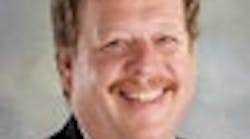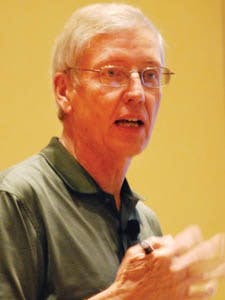Check Out Montague's Google+ profile.
So you want be inspiring and ingenious? Congratulations, it's a very worthwhile path. However, it's also fraught with stress, frustration, organizational obstructions, personal conflicts, uncooperative colleagues, calcified managers, incentives against change, minefields, face-plants, thankless chipping away in obscurity and little recognition even if you finally succeed.Despite these and other hurdles, an expert panel explored many ways to instill and nurture true ingenuity this week at the Emerson Global Users Exchange in Orlando, Florida.
"We're preparing the next generation to take over from us old folks, but we're all going to have to think in different ways to help them get to the next level," said moderator Dave Beckmann, Emerson's retired senior marketing vice president. "This also means shaking up management and pushing against tradition. Our old ways of thinking were never designed to carry the strain of a whiplash economy, technological disruptions, global competitors, fractured markets, omnipotent customers, rebellious shareholders and idealistic employees who strive for significance over pay. Managing in the 21st century with its Facebook, WhatsApp generation means we're going to have to move away from the status quo."
"Managing in the 21st century, with its Facebook, WhatsApp generation means we're going to have to move away from the status quo." Dave Beckmann challenged Emerson Exchange attendees to be passionate and think differently.
"Over long periods of time, low-probability events can build up," said panelist Greg Stephens, vice president of consulting solutions at URS Professional Solutions. "The Fukushima facility was designed well physically, but its emergency fuel was stored offsite, and the March 2011 earthquake and tsunami shorted out its generator bays, pumps and instruments. Now decontamination is going to take until 2020, and de-fueling will take another eight to 15 years." Beckmann added that total clean-up costs will be about $3 trillion.To help avoid these kinds of incidents and potential catastrophes, Sandy Vasser, instrument and electrical manager of the facilities group at ExxonMobil Development Co., reported it's crucial to get management to listen to what needs to be done, and simplify systems and equipment whenever possible. He added this has been greatly helped by migrating from traditional I/O approaches to adopting smart I/O methods like Emerson Process Management's CHARMs electronic marshalling solution.
"We talking capital efficiency in every meeting," said Vasser. "We often say ‘you can't get something wrong if don't have to do it,' and so we seek to eliminate steps, designs and equipment. Twenty-year-old cabinets can have a lot of wires, but we can eliminate a lot of them with DeltaV and CHARMs. And using standardized cabinets and systems like these can also help reduce a lot of former customization, specifications, FATs [factory acceptance tests] and documentation on the 20 or 30 projects we do simultaneously.
"We just need a better way to manage all these tasks and information, but we're not there yet. The biggest hurdle is stopping people from doing what they've always done. For example, standard cabinets don't need FATs, but some objectors say FATs are needed to verify software designs, so we're trying to solve this by doing virtual FATs in the cloud."
Robert Wojewodka, technology manager and leader of the Process Improvement Team at Lubrizol, says his company reduces organizational friction by concentrating on cooperation, teamwork and trust. "Management relies on engineering and other technical groups regarding new projects," said Wojewodka. "We stay focused on value-add to help justify process investments. We also have long-term supplier partnerships to help ensure seamless consistency on a global scale. We strive to break down silos of power, so operations managers respect the input of every individual regardless of title. You need to move from being managed to managing, expand your sphere of influence and navigate the minefield of encouraging your management do the right things. The bottom line is you have to be willing to step on some mines, but keep advancing projects and visions forward."
"Conventional thought for achieving project success has been to focus on perfecting the way projects have always been executed," added Vasser. "However, this has burdened and impeded the identification of change because only improving on what has always been done can only result in incremental improvements at best. Challenging traditional and proven practices is difficult, but we have got to redefine and transform how we execute automation projects."








